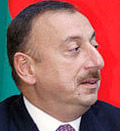Yesterday the Russian Rusrep.ru website has publicized the regular portion of Wikileaks materials, which this time related to the dominating logic within the Azerbaijani administration. The cables signed by then the US ambassador to Azerbaijan reveal the US anxiety over Azerbaijan’s resistance to the Turkish-Armenian reconciliation process, the deteriorating state of the US-Azerbaijani and the Turkish-Azerbaijani relations. One of the cables squarely addresses the problem of the growing Russian influence over Azerbaijan and the Russian arms transfer to Armenia. The materials include the cables of the US Ambassador to Azerbaijan Anne Derse dating 2006-2009, which were sent to the State Department. Titled “Bringing Ilham along: How to convince Azerbaijan to stop undermining the Turkey-Armenia Process” Ambassador Derse writes, “The advantages that have accrued to Azerbaijan from the border closure have certainly been minimal and if anything the returns are diminishing. Furthermore, Azerbaijan, even with its focus on improving its military capability, is unlikely anytime soon to structure a force large or well-equipped enough to overcome the terrain advantages enjoyed by the NK Self-Defense Force and the Armenian army.” When speaking of the Armenian-Turkish relations and the reluctance of Baku in this regard, Derse writes, “Baku deeply fears the loss of its key lever on the Armenians – the closed border with Turkey – and sees little incentive for Sargsyan to negotiate in good faith in a post-open border environment. That Turkey is willing to give up this leverage while gaining nothing on NK is seen as an outright betrayal. The Turks have blamed the Americans for forcing them into this reconciliation process, so the sense of betrayal extends to the U.S. as well.” In the cable of the American Ambassador there is also certain information about Aliyev’s policy. “Moreover, we are at a point where increasing Aliyev’s prestige in a matter that elevates him personally will give him room to show some results for his pro-Western policy orientation, strengthen his position vis-à-vis Russia and the confidence to stay at the table in the Minsk process,” writes Derse by comparing with the famous film “Godfather.” According to the Ambassador, Aliyev contains two images of Corleone. He is Michael Corleone in his foreign policy and Sony Corleone – in the internal politics. The Ambassador emphasizes that Aliyev is extremely concerned about every attempt of criticism to his government and strives for absolute power. Derse also writes about his meeting with Aliyev in 2009. During the meeting Aliyev rebuked the US by saying that the White House is ignoring the interests of Azerbaijan and doesn’t pay attention the fact that Azerbaijan supports the United States in various issues. He specifically complained that the Nagorno-Karabakh issue is ousted from the process of rapprochement of Turkish-Armenian relations. The Ambassador also wrote about the Azerbaijani elite. “Generations of Baku’s top families have been educated at Russian universities. Much of Azerbaijan’s power elite is known to have enormous financial interests in Moscow. Russia also hosts over 800,000 guest workers from Azerbaijan, many of whom are villagers who find work at Russian construction sites or in street markets. These workers, in turn, remit wages to relatives in some of Azerbaijan’s poorest districts. Local economists note that these remittances constitute the bulk of economic activity in rural Azerbaijan) areas far removed from the new wealth of Azerbaijan’s offshore oil fields. Should Russia expel these guest workers or otherwise disrupt the flow of remittances, Azerbaijan would be subjected to an enormous economic blow, and quite possibly significant social unrest.”

